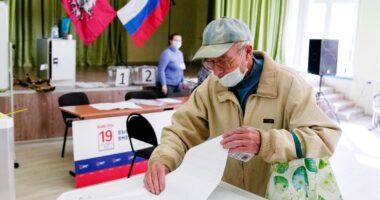
On May 30, the second night of protests in Des Moines, Foote marched with a large crowd to the Capitol building.
During those early protests, people gathered based on word of mouth, usually spread through social media. They chanted “I can’t breathe,” held signs reading “Prosecute Killer Cops” and told stories of racial harassment they’d experienced while marching to government buildings. Some protesters vandalized businesses downtown and at a mall on the north side, damaged police vehicles and threw rocks; police said in court filings that some officers were bruised, cut and required stitches.
Des Moines police had been working with an FBI task force, officers later said in court, searching for members of antifa “who we were told were in town coordinating events.” Police flew drones over the marches and embedded undercover officers to keep watch, court records show.
After police fired tear gas at protesters on that second night of demonstrations, Foote retreated to another neighborhood downtown. Just after 2:30 a.m., police received a report that people had broken into a grocery store. Ten minutes later and two blocks away, as Foote walked alone to her car, she said, a group of officers cornered her. Without warning, they pepper-sprayed her and hit her with batons, she said, before arresting her on charges of participation in a riot, unlawful assembly and failure to disperse. Photos taken by her partner after she was released from custody show grapefruit-size bruises on her arms and legs.
When Foote was released to await trial, the court placed her on an 8 p.m. curfew. She had trouble leaving her apartment for weeks anyway, she said, because of trauma from that night — she once had a panic attack at a grocery store after seeing an officer sitting in his vehicle outside. But she also felt more committed to the cause. She raised money for a bail fund to support other protesters and became a regular at City Council meetings.
“It’s made me want to fight harder,” she said. “We have our local police department getting away with doing these things.”
After prosecutors dismissed her charges citing insufficient evidence, Foote sued the city and police department in December alleging malicious prosecution, assault and battery, and false imprisonment, seeking damages. The city filed a response in February denying her account and the suit is pending in federal court. The police department said it could not comment on pending litigation.
“Our response to violence directed at our officers, and the unlawful destruction of property, was based on our training and experience,” Sgt. Paul Parizek, a police department spokesman, said in an email. “As we’ve moved forward since those days, just like other law enforcement organizations across the nation, we’ve improved policy and practice based on the best practices available now, and lessons learned then.”
For more of NBC News’ in-depth reporting, download the NBC News app
Last year, the police department promised a “comprehensive review” of its use of force during the summer’s demonstrations. Police briefed the City Council on the findings, but Parizek said he couldn’t release information because of pending court cases.
“This level of protest and activism really is something our community hasn’t seen, and that includes our law enforcement,” said Josh Mandelbaum, a Des Moines City Council member who is white. “I don’t think they were prepared for sustained protests like this.”
‘This is what I should be doing’
After a few days of protests, more than a dozen Black teens and 20-somethings who’d connected through the events began to organize as the Des Moines Black Liberation Movement. They included Yena Ana Balekyani, who had previously started a nonprofit to support Congolese youth in the state, and Linda Brown, who worked with a local artist collective that mentors public school students. Jaylen Cavil had just finished working on a Democratic Senate campaign when he got involved.
The organizers put a spotlight on systemic problems: Black residents of Iowa are 11 times more likely to be imprisoned than white residents and 7.3 times more likely to be arrested for marijauna possession — double the national disparity. While there hasn’t been a high-profile police killing of a Black person in recent years locally, there have been several cases in which the city paid settlements to Black residents who alleged officers used excessive force and racially profiled them.
“It doesn’t have to be police killing you with a bullet — there are other ways the system kills you,” said Balekyani, 26, who grew up in Des Moines.
Sgt. Theodore Stroope, president of the Des Moines Police Gold Braid Organization, a union, said the fact that Des Moines had not seen mass protests against police in recent years was evidence law enforcement had a solid relationship with the community. The department started a community policing program in the 1960s, banned chokeholds in the 1990s and had already implemented most of the #8CantWait policies pushed by some reformers, he said. According to the department, officers use force in about 1 out of every 592 calls for service.
“The police keep getting blamed for the problems that they have zero control over,” Stroope said. “The police never redlined anybody, the police never denied anybody a job, the police never denied anybody a bank loan.”
But to the organizers, who favor abolishing the police department, there was still plenty that needed to change. They wrote out a list of demands for city and state leaders — ban racial profiling by police, decriminalize cannabis, create a civilian oversight board for the police — and on June 3, they marched to Mayor Frank Cownie’s house with more than 1,000 people to present it.
When the protesters arrived, Cownie, who is white and has been mayor since 2004, spoke to them through a bullhorn on his lawn, pledging to support some of their demands and promising to put a racial profiling ban to a City Council vote that month.
“You had a huge group of people unified and getting traction, getting covered in the news, the mayor having to respond to every single demand, because he’s forced to when we’re at his house,” said Cavil, who was in the crowd that night. “That’s power.”
Cownie declined multiple interview requests.
Progressive activists and local chapters of the NAACP had pushed for the racial profiling ban for two years, but faced resistance in the all-white City Council. Days after the march on the mayor’s house, one of the police unions, the Des Moines Police Bargaining Unit Association, complained in an email to City Council member Joe Gatto that the proposed ordinance was “meant to ‘appease’ a riotous mob and protestors,” and would “tie the hands of law enforcement.” (The union did not respond to a request for comment.)
“It doesn’t have to be police killing you with a bullet — there are other ways the system kills you.”
Yena Ana Balekyani
The racial profiling ordinance was on the agenda at the next council meeting, on June 8, and more than 1,300 people tuned in on Zoom. Among them was Indira Sheumaker, 26, a Black Liberation Movement organizer who’d never been to a meeting before. She tore into the council when it was her turn to speak.
“It is ridiculous that it took hundreds of people coming to Mayor Cownie’s house, coming to his front yard, for you guys to move on this at all,” she said during the public comment portion. “It is 2020, and we don’t have a ban on racial profiling in Des Moines, Iowa, a place we pretend is so liberal and so accepting? It is not.”
The council unanimously passed a ban June 22 but did not include a civilian oversight board, one of activists’ chief goals. The ordinance outlaws racial bias in government and law enforcement actions, requires police to undergo annual de-escalation and implicit bias training, and gives people a route to complain to the city about alleged violations.
Sheumaker credits her younger sister, Paden, with encouraging her to take the microphone at rallies and City Council meetings. It wasn’t that Sheumaker had been afraid of public speaking — she took part in plays in high school and college — but she said she’d grown up assuming that she shouldn’t challenge authority.
In June, she started to speak to crowds about problems with policing, bail and her own experiences with racism. She urged people to step out of their comfort zone, “because we’re all uncomfortable right now,” as she put it in one speech last summer, standing on top of a white SUV.
“Everything I thought people expected of me suddenly changed,” she said in an interview. “It was like, ‘Oh, this is what I should be doing.’ I need to be saying these things because these are important and they need to be said.”
Sheumaker, who was furloughed from work at a community center, also began looking at city budgets. In August, she called attention to city plans to approve police purchasing $99,000 in ammunition. So many people joined the next virtual City Council meeting to object that it lasted 11 hours.
The City Council was unaccustomed to so much attention by activists who didn’t follow procedural rules and voiced complaints every chance they got, disrupting discussions of other topics, such as stormwater management or approving a new car wash. Multiple activists used profanity and called council members racist.
“Everything I thought people expected of me suddenly changed.”
Indira Sheumaker
“It’s been pretty rough language — I would call it a lot of ‘soap words,’ as my mom used to say,” Carl Voss, a City Council member, said in an interview. “Which is completely uncalled for, I believe. These are supposed to be our meetings, not their meetings.”
The council now caps public comment to 30 minutes total, no matter how many people sign up to speak, meaning people have been given as little as 24 seconds at recent meetings.
Sheumaker concluded the council needed new blood — specifically, someone like her. She announced her campaign in February, seeking a seat in this fall’s election representing the northwest corner of the city, where she was raised. Her campaign motto echoes the revolutionary group Black Panthers’ battle cry from a half century ago: “All power to the people.”
Source: | This article originally belongs to Nbcnews.com










